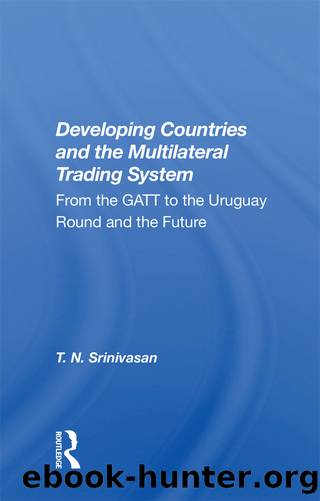Developing Countries and the Multilateral Trading System: From the Gatt to the Uruguay Round and the Future by T. N. Srinivasan

Author:T. N. Srinivasan [Srinivasan, T. N.]
Language: eng
Format: epub
Tags: Business & Economics, International, General
ISBN: 9780813367910
Google: KYNbPwAACAAJ
Goodreads: 1839444
Publisher: Westview Press
Published: 1998-01-01T00:00:00+00:00
Trade and Labor Standards
Movements to improve the environment that governs employment and conditions of work, such as employment of women and children, hours of work, safety of the workplace, and materials handled in production, date back to early-nineteenth-century Europe.4 Brown, Deardorff, and Stern (1996) suggest that these movements were driven primarily by ethical considerations. Although the link between labor standards and international trade was recognized by the reformers behind the movements, these authors cite Alam's (1992:13) observation that the reformers generally took free trade as a given and desirable objective and sought to use moral suasion and international agreements to deal with differences among countries in labor standards. Indeed, the International Labor Organization (ILO) was founded as part of the implementation of the Treaty of Versailles of 1919, signed by the adversaries of World War I. In its decisionmaking bodies, workers, employers, and the state are represented. It has since been the premier organization in promoting better labor standards through international agreements and moral suasion. As Heribert Maier, its deputy director-general, points out,
Over the past 75 years the ILO has adopted a series of conventions which set international labor standards. Through ratification, these conventions create binding obligations for member states. The conventions cover a wide range of issues in the world of work, including basic human rights such as freedom of association, the right to organize and bargain collectively, freedom from forced labor, freedom from discrimination in employment, arid severe restrictions on the use of child labor. (Maier 1994:12)
He emphasizes, rightly, that "traditionally, the ILO's principal means of action has been persuasion. On the whole, the focus of the international labor standards has been on their ratification, their inclusion into national legislation, and compliance with them in a national context" (Maier 1994:12).
It is worth repeating that the ILO conventions were arrived at by multilateral agreement and their enforcement relied largely on the moral force motivating the conventions. No explicit sanctions, particularly sanctions in the form of withdrawal of rights of access to international markets, were envisaged against countries that either do not ratify any of the conventions or do not in practice comply with those that they have ratified.
The deceptively appealing notion that lower labor standards in a country relative to its trading partners confers on it an unfair competitive advantage was already present in the charter of the ITO. Article 7 of the stillborn ITO stated, "The members recognize that unfair labor conditions, particularly in the production for export, create difficulties in international trade, and accordingly, each member shall take whatever action may be appropriate and feasible to eliminate such conditions within its territory." Except for prohibition of trade goods made with prison labor, the articles of the GAIT did not deal with labor standards. Various administrations in the United States, Democrat and Republican, proposed the inclusion of a labor standards article in the GATT, unsuccessfully as it turned out, during several rounds of the MTNs. Similar proposals have been made by political parties in national parliaments in several European countries and also in the European Parliament.
Download
This site does not store any files on its server. We only index and link to content provided by other sites. Please contact the content providers to delete copyright contents if any and email us, we'll remove relevant links or contents immediately.
| Anthropology | Archaeology |
| Philosophy | Politics & Government |
| Social Sciences | Sociology |
| Women's Studies |
The Secret History by Donna Tartt(19053)
The Social Justice Warrior Handbook by Lisa De Pasquale(12187)
Thirteen Reasons Why by Jay Asher(8893)
This Is How You Lose Her by Junot Diaz(6877)
Weapons of Math Destruction by Cathy O'Neil(6265)
Zero to One by Peter Thiel(5787)
Beartown by Fredrik Backman(5737)
The Myth of the Strong Leader by Archie Brown(5500)
The Fire Next Time by James Baldwin(5431)
How Democracies Die by Steven Levitsky & Daniel Ziblatt(5215)
Promise Me, Dad by Joe Biden(5141)
Stone's Rules by Roger Stone(5081)
A Higher Loyalty: Truth, Lies, and Leadership by James Comey(4954)
100 Deadly Skills by Clint Emerson(4921)
Rise and Kill First by Ronen Bergman(4780)
Secrecy World by Jake Bernstein(4741)
The David Icke Guide to the Global Conspiracy (and how to end it) by David Icke(4709)
The Farm by Tom Rob Smith(4502)
The Doomsday Machine by Daniel Ellsberg(4484)
